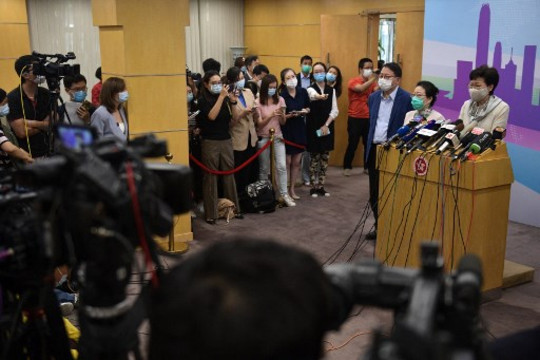According to a survey conducted by the Foreign Correspondents’ Club, Hong Kong (FCC), an overwhelming majority of respondents are concerned about the possible introduction of a fake news law, with 75.8 percent of them saying they were “very concerned” and a further 15.1 percent expressing some concern.
Hong Kong’s Chief Executive Carrie Lam first signaled in May that the government was considering introducing legislation to address the “increasingly worrying trend of spreading inaccurate information, misinformation, hatred and lies on social media.” In her policy address made in October, Lam once again expressed the government’s intent to introduce a fake news law as part of its efforts to “safeguard national security.”
One respondent of the survey said, “It’s already clear to me that officials in high office in Hong Kong believe that ‘fake news’ is a label they can apply to news or commentary that they don’t like, regardless of whether it is ‘fake’.”
At the same time, the FCC’s poll also highlights a decline in press freedom in Hong Kong after the National Security Law took effect on June 30, 2020. Nearly 84 percent of respondents said the working environment had changed for the worse for them as journalists, because of uncertainty about the authorities’ “red lines” as well as increasing self-censorship among journalists, media organisations and sources.
Some 15 percent of respondents said there had been no change in the media environment under the National Security Law, with only 1 percent saying working conditions had changed for the better. As much as 86 percent of the 99 journalists polled said sources became less willing to talk about sensitive issues, while 14 percent reported no change, according to the survey.
“In many ways it has become worse than the mainland because nobody knows what the red lines are and there is real fear that previous coverage could be scrutinised. Self-censorship and the drying up of sources is another result of the NSL,” said another respondent in the poll conducted from August to October.
The survey results indicated marked concern by correspondents and journalists about the possibility of arrest and prosecution over reporting or writing opinion articles, with 61 percent of them reporting slight concern and 10 percent expressing considerable concern. Meanwhile, nearly half of foreign journalists said they were considering leaving Hong Kong because of declining press freedom.
According to FCC President Keith Richburg, the survey was the first of its kind aiming to gauge the media environment in Hong Kong, following “a lot of talk and anecdotal evidence about concerns over the state of press freedom in Hong Kong.”
Richburg said, “We would like to conduct this kind of survey on a regular, recurring basis so we can continue to gauge the sentiment among our members who are working actively as journalists and let the results be made publicly available. We hope this survey, and any future ones, can help contribute to the ongoing discussion about the state of press freedom in Hong Kong.”
The IFJ said, “International experience has shown that legislations touted as combating fake news have often been used by governments and public figures to suppress critical or unfavorable reporting. The Hong Kong government, which is obliged to observe freedom of the press according to the Basic Law, should take note of concerns raised by members of the press over the possible fake news law and engage in measures to ensure that journalists can work freely without fear of punishment or reprisals."

